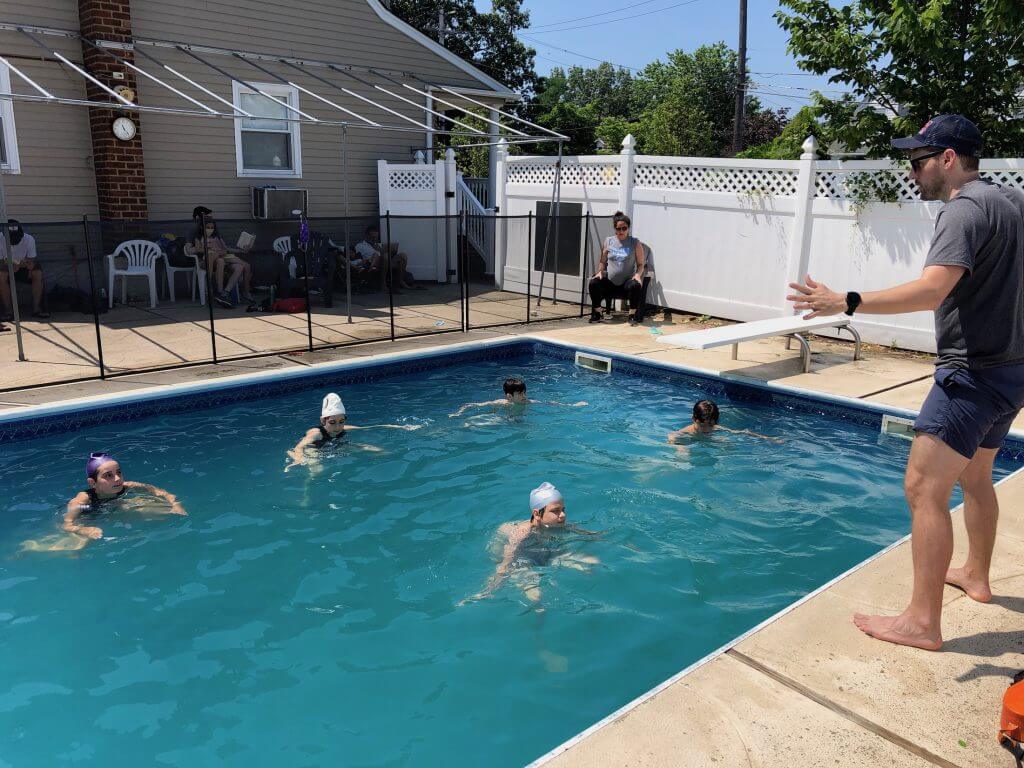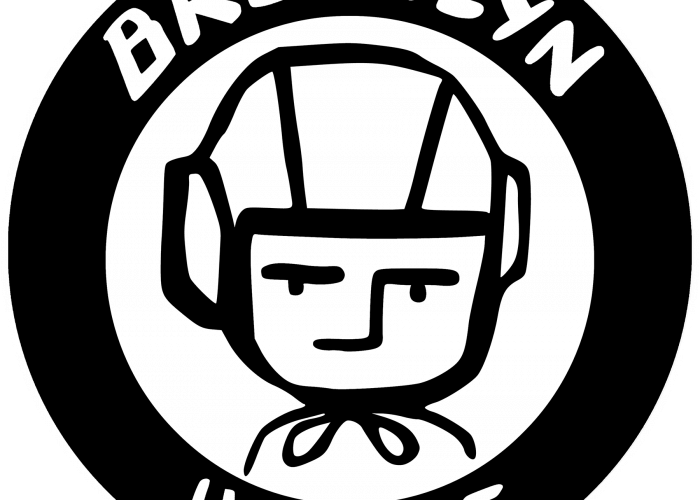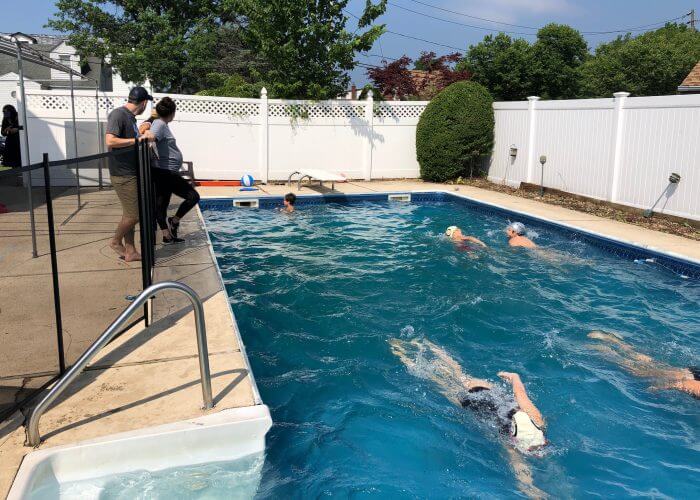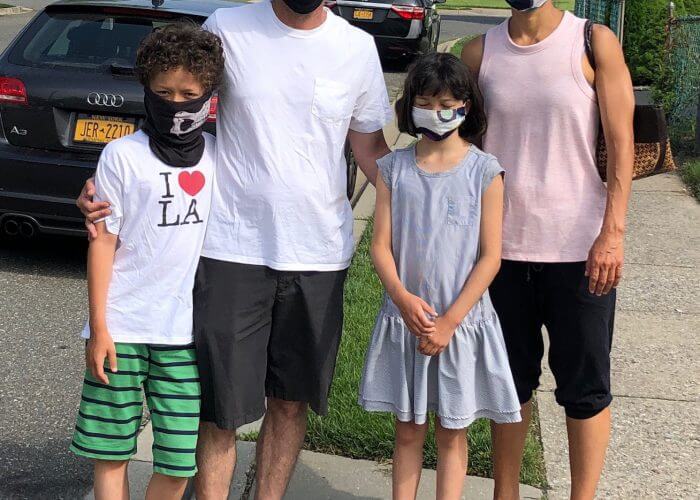After Months Indoors Suburban Pool Time Beckons Brooklyn Kids

“It was amazing getting back in the water,” said Nate Schulhoff, who confessed it felt like forever since he was last able to swim.
 For 11-year-old Sabrina Kazemi, along with her friend Naila Noble, the chance to jump into a pool—even in the midst of a pandemic—was simply too good to pass up.
For 11-year-old Sabrina Kazemi, along with her friend Naila Noble, the chance to jump into a pool—even in the midst of a pandemic—was simply too good to pass up.
“It was really nice; I love being in the water,” she said, then added wistfully, “I wish we could do it more—but we’ll try as often as possible.”
The occasion? Earlier this month, members of the Brooklyn Water Polo Club swam together—albeit in a limited fashion—for the first time in four months. The club rented time at an in-ground private pool in suburban Long Island, approximately 40 minutes by car from members’ homes in downtown Brooklyn. Six athletes and two coaches—the husband-and-wife team of Mike Byrd and Layla Behzadian—jumped into the refreshing backyard pool.
To get back in the water, the club looked to Swimply, a year-old rental service known as “Airbnb for pools.” The backyard pool—40’ x 20’—was entirely different from the club’s usual practice spots—indoor pools at Long Island University’s downtown Brooklyn location or at Medgar Evers College in Bedford-Stuyvesant. Nevertheless, the Swimply-supplied pool provided exactly what the youngsters craved: physical activity and friendship.

Mike Byrd and Layla Behzadian watch over their athletes. Photo Courtesy: N. Relnick
“It’s great that they get to go into a pool and practice like they used to,” said Naomi Relnick, mother to nine-year-old Scarlett and 11-year-old Max Lippiatt. “They’re lucky! They get to jump in a pool and see their friends.”
A fitness trainer specializing in yoga, Relnick has kept her children active the past few months—though Zoom schooling and curated physical activities go only so far in filling the life gap created by the virus.
“I feel like it could take another one, two years for things to get back to what they used to be,” she said.
Safely facilitated connections and activity, according to Todd Lippiatt, dad to Max and Scarlett, might be the best antidote for a virus-induced black cloud shadowing the experiences of all New Yorkers—and young people in particular.
“This is no doubt going to be one of the most memorable things of their childhood,” said Lippiatt. “Kids are incredibly impressionable; it’s a matter of keeping their spirits up because they’ve lost everything they know to be normal.”
There’s little surprise that someone expanded the Airbnb model to other types of properties. Simple principles of supply and demand made it possible for Swimply to take advantage, at least temporarily, of aquatic sports’ greatest obstacle during the pandemic: pool time. With public pools only now opening, Swimply’s rental business plan provides a great opportunity for young athletes to exercise and get reacquainted.
For Gabriel Noble, Naila’s father, the outing was memorable, although he wasn’t entirely clear about how it worked.

A family like many impacted by the coronavirus. Max, Todd and Scarlett Lippiatt with Naomi Relnick. Photo Courtesy: M. Randazzo
“I thought this was a private home of somebody associated with [our club], so I’m happy to be part of this Guinea pig experience of renting a pool,” he said. Asked about how wise it was to have a group of adults and coaches congregate—albeit outdoors around a chlorinated pool—Noble maintained that it was safe because of the precautions taken.
“I feel really comfortable with it,“ he said. “We got tested; I know the other kids were asked to be tested. I feel [that] we’re all playing on the same team—that is, we’re thinking about safety first … [and] we all did our part.”
After a couple of hours in the pool swimming laps, practicing the egg-beater technique so distinctive to polo, and working through other exercises, the youngsters emerged and toweled off, and the experiment seemed a success.
But as parents and children lingered on the suburban sidewalks of Inwood, a reminder of current hazards intruded on the morning’s languid mood. A next-door neighbor—angered by the noise of splashing children and perceiving indifference to the pandemic due to their maskless exercise—confronted the Brooklynites.
Generously mixing obscenities amid complaints of a “commercial group” making trouble in a residential neighborhood, the disgruntled neighbor—who, ironically, was not wearing a mask—stormed off, leaving the clear impression that Swimply and its inventive model may need a bit of tweaking.
Before returning to the urban reality of Brooklyn, Nate Schulhoff reflected on his absence from training.
“It’s been sad because I was getting better at water polo,” he said, then added hopefully, “If I keep doing this, I’ll be as good as I used to—and probably better.”
Editor’s note: the author is a parent involved with the Brooklyn Water Polo Club.




The headline makes no sense?
Dear Colleen:
I did miss your comment. As you might note, this was a personal piece; in trying to encapsulate the experience in a punchy headline I (apparently) did not convey this.
For NYC aquatics athletes—ones accustomed to training 3 – 4 times a week—the reality of no water (and, in many cases, no outdoors activities) has been VERY difficult. I hope that reality came through in the piece (even if the headline didn’t sell it properly).
Your correspondent